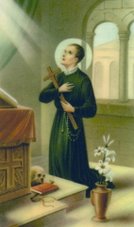Have a Blessed Feast of St Philip Neri
 "My heart grew hot within me, and in my meditation a fire shall flame out..."
"My heart grew hot within me, and in my meditation a fire shall flame out..."
Second Alleluia (Psalm 38:4)
 "The charity of God is poured forth in our hearts, by His Spirit dwelling within us"
"The charity of God is poured forth in our hearts, by His Spirit dwelling within us"
Introit (Romans 5:5)

We were lucky enough to begin the feast of St Philip Neri, the founder of the Oratorian congregation, last night with First Vespers presided over by Cardinal Foley, who is staying at the Birmingham Oratory during this special time. For more on his visit, see
the Cause Website.
He celebrated Vespers beautifully, which consisted of traditional Gregorian chanting of five Latin Psalms intoned by the Cantors (four of the Oratory clergy, vested in copes and sitting on the red stools). This then lead to the
Magnificat, the song of the Blessed Virgin Mary, which was sung elaborately by the Oratory choir, during which the Altar was incensed by the celebrant (in this case Cardinal Foley).
A special part of last night's ceremony was the Blessing with St Philip's relic (
right). There is actually an opportunity for anyone to receive this blessing every Monday at 8pm. Last night, it was of course, more elaborate and solemn. It included a procession to the reliquary (
seen in the top picture) where Cardinal Foley blessed it with incense (an ancient act dating back to the Israelites to symbolise the rising up of our prayers to heaven).

After Vespers we also have Benediction of the Blessed Sacrament, where the Celebrant blesses all the Faithful with the Blessed Sacrament held in a monstrance (left). This act of adoration seeks to extend the blessings encountered during the midst of the Mass, when the Host is elevated for brief veneration.
The Cardinal's American accent was no longer evident as he took up the sung Latin Collect with great care and prayerful attention:
Deus, qui beátum Philíppum Confessórem tuum, Sanctórum tuórum glória sublimásti: concéde propítius; ut cujus solemnitáte laetámur, ejus virtútem proficiámus exémplo. Per Dóminum...
O God, who hast exalted blessed Philip, Thy confessor, in the glory of Thy saints: grant in Thy mercy, that we who rejoice in his festival, may profit by the example of his virtues. Through Christ our Lord... Amen.
For more about the Saint, the holy and inspirational Philip Neri, see a
previous post of mine. Vespers at the Oratory uses the traditional breviary pre-1969, but follows the revised calender depending on the feast and its corresponding
Magnificat Antiphon and
Collect.



















 Birmingham is fairly unique in that, when the Abortion Act of 1967 was passed, pressure from leading gynaecologists (including one who stated on television "Whatever the law says we will not murder little children in Birmingham") meant that, to this day, NHS establishments do NOT provide abortion in Birmingham. It has thus been the abortion factory of Calthorpe Clinic in Edgbaston (just near the Birmingham Oratory) which the NHS pays to provide women with their "reproductive rights". It seems obvious to me that this is an almost worse situation, since the advocates of abortion will have the monopoly in this clinic, and clearly offer very biased information to women in distress. For instance, I have come across many naive young girls who think that abortion is completely safe, and sadly come across fertility and gynaecological complications later on down the line. I'm sure the Calthorpe Clinic makes most of its money (up to £960) from private patients, and thus pitches itself particularly for overseas women who can fly in, have their baby killed, and then fly out again (sometimes all on the same day:
Birmingham is fairly unique in that, when the Abortion Act of 1967 was passed, pressure from leading gynaecologists (including one who stated on television "Whatever the law says we will not murder little children in Birmingham") meant that, to this day, NHS establishments do NOT provide abortion in Birmingham. It has thus been the abortion factory of Calthorpe Clinic in Edgbaston (just near the Birmingham Oratory) which the NHS pays to provide women with their "reproductive rights". It seems obvious to me that this is an almost worse situation, since the advocates of abortion will have the monopoly in this clinic, and clearly offer very biased information to women in distress. For instance, I have come across many naive young girls who think that abortion is completely safe, and sadly come across fertility and gynaecological complications later on down the line. I'm sure the Calthorpe Clinic makes most of its money (up to £960) from private patients, and thus pitches itself particularly for overseas women who can fly in, have their baby killed, and then fly out again (sometimes all on the same day:



 The loss of the priest's unique intimacy with the sacred has subtly, but mightily, contributed to this development. While insisting that nothing has essentially been changed for the priest because he is still the one who consecrates, the liturgical engineers have made his presence optional at the most intimate moment of holy communion between the flock under his care and Our Lord. The majority of Catholics receive the Eucharist from the hands of a lay person. The act of shared intimacy that is at the heart of shepherding ("Feed my lambs, feed my sheep") is absent. The Church, echoing an increasingly feminized society, is telling priests: "Once you have consecrated, you are no longer needed." The act of the priest "feeding" the faithful with the Bread of Life incarnates his role as Its sole provider and, far more than the eye can see, forms his and his people's perception of his spiritual fatherhood. The priest's role was never confined to the sanctuary, but what made him unique to his people was his unique relationship to the Eucharist which he brought forth from within the sanctuary. The commitment to celibacy in the Latin Rite was the tangible sign of the Eucharistic "Christ-man."
The loss of the priest's unique intimacy with the sacred has subtly, but mightily, contributed to this development. While insisting that nothing has essentially been changed for the priest because he is still the one who consecrates, the liturgical engineers have made his presence optional at the most intimate moment of holy communion between the flock under his care and Our Lord. The majority of Catholics receive the Eucharist from the hands of a lay person. The act of shared intimacy that is at the heart of shepherding ("Feed my lambs, feed my sheep") is absent. The Church, echoing an increasingly feminized society, is telling priests: "Once you have consecrated, you are no longer needed." The act of the priest "feeding" the faithful with the Bread of Life incarnates his role as Its sole provider and, far more than the eye can see, forms his and his people's perception of his spiritual fatherhood. The priest's role was never confined to the sanctuary, but what made him unique to his people was his unique relationship to the Eucharist which he brought forth from within the sanctuary. The commitment to celibacy in the Latin Rite was the tangible sign of the Eucharistic "Christ-man."








